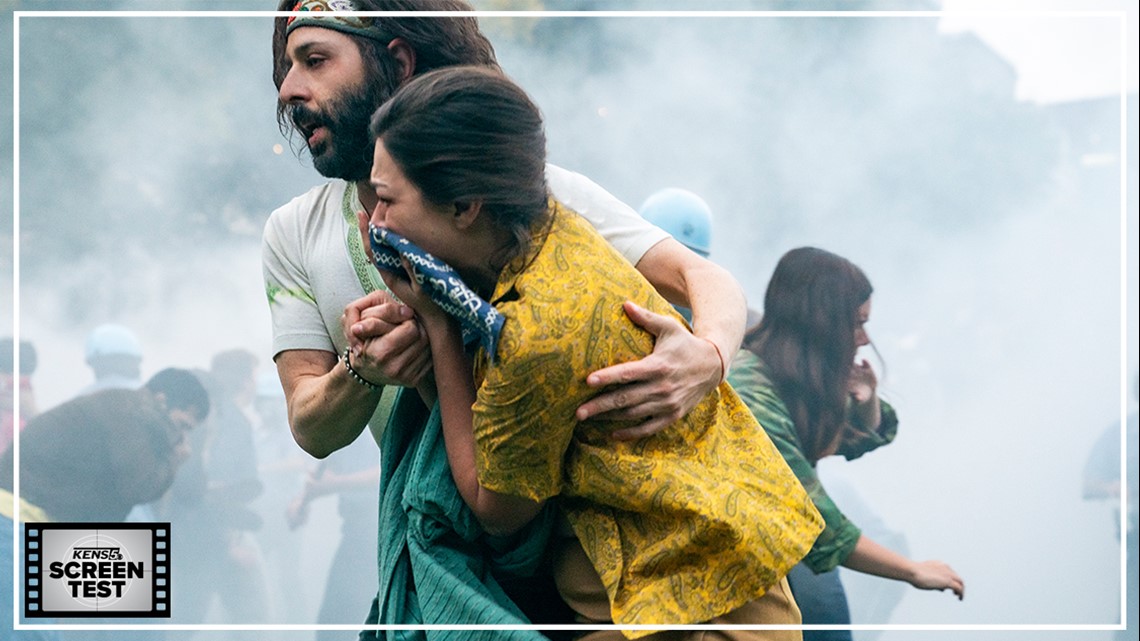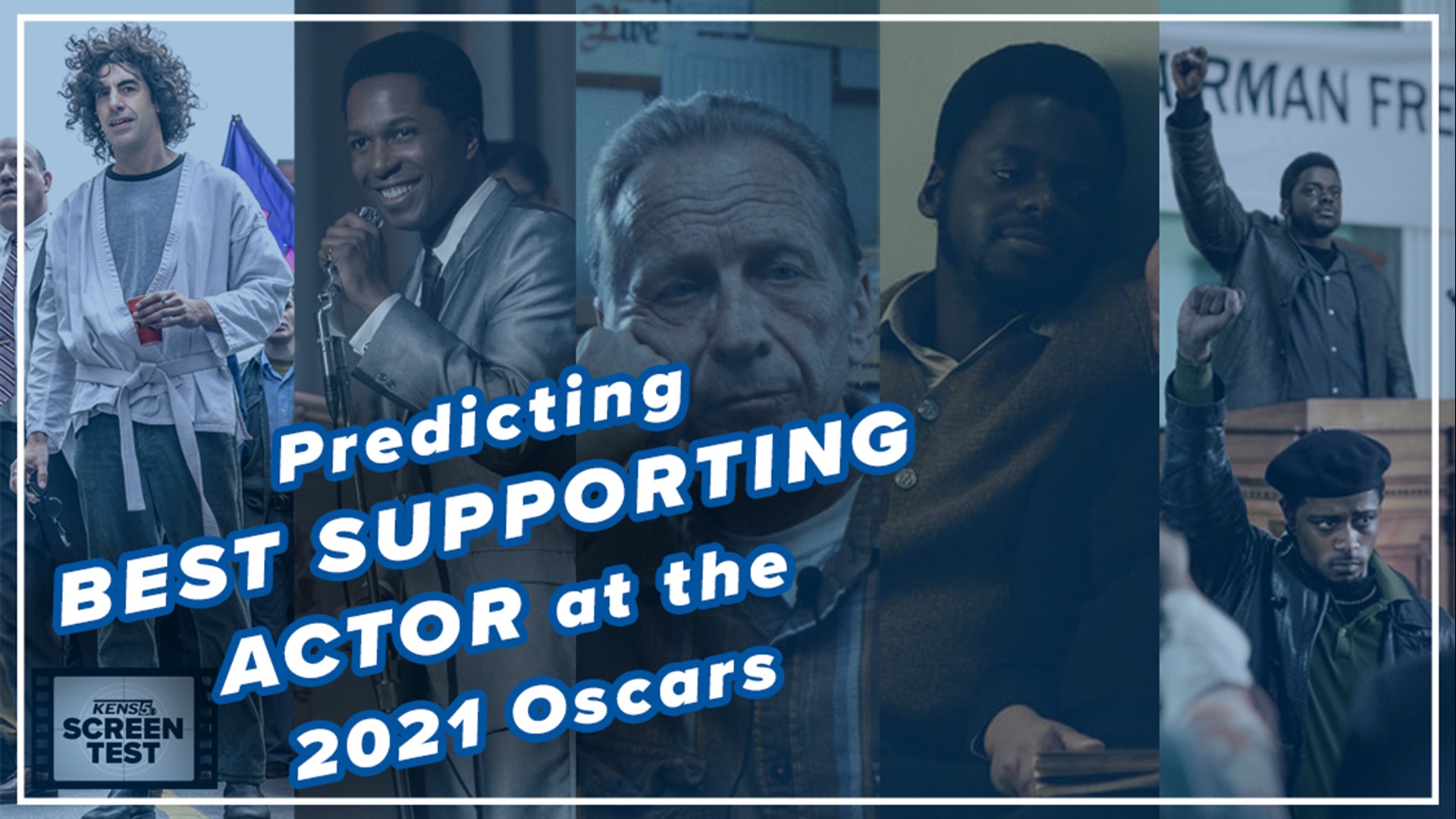Every now and again in “The Trial of the Chicago 7,” the new courtroom drama from Aaron Sorkin that insists itself a momentous work and sometimes proves it, a phrase or assertion will pop out from the dialogue that jolts us to the present moment. “Progressive politics,” “revolution” and a sign reading “America: love it or leave it” are a few of those portals—the implications are as self-evident as they are evergreen. These moments are a little uncanny, though, because for how clearly the sociopolitical blade of Sorkin’s screenplay is sharpened by primetime imperative (it hits Netflix Friday, less than three weeks before Election Day) and despite having his grasp firmly on the hilt of trademark dialogical acrobatics, it’s difficult to distinguish where exactly the “Social Network” and “Steve Jobs” scribe is looking to make his deepest cuts.
It’s the summer of 1968. The Vietnam War is in full tilt, an increasing number of draft notices are being mailed out and a group of young activists are planning to meet in Chicago to lead thousands in peaceful protest during the Democratic National Convention—well, the plan is to peacefully protest. A jovial collage of a cold open tunes the viewer to the bullhorn-ready urgency of the moment while skipping across geography to introduce us to the titular “7,” among them the cool-headed college student Tom Hayden (a rubber-accented Eddie Redmayne); the hotter-headed Abbie Hoffman (Sacha Baron Cohen); Black Panther Party co-founder Bobby Seale (newly minted Emmy-winner Yahya Abdul-Mateen II); and suburban everyman David Dellinger (John Carroll Lynch). Foundations are laid both for film’s characters and film’s maker; the prologue sees Sorkin gleefully setting familiar priorities of fleet-footed storytelling (priorities that inevitably influence all other aspects of this movie’s craft) and our young demonstrators-to-be set their plans with firm conviction.
Cut to several months later, and those plans have – in history and in movie – devolved into what’s about to be a polarizing courtroom showdown. The Chicago protests had become Chicago riots. Marchers had become suspects. And, having been charged with conspiring to light the match, the struggle of Tom, Abbie, Bobby and David (along with Alex Sharp’s Rennie Davis, Jeremy Strong’s Jerry Rubin, Danny Flaherty’s John Froines and Noah Robbins’s Lee Weiner) for the future of their country has become a struggle for the future of their lives. Though if the movie’s mentions of metaphor are any indication, those may not be mutually exclusive.


It’s easy to understand why Sorkin would be attracted to the trial, which would ultimately last for six months but be etched into history’s annals, as the subject of his second stab at feature directing after 2017’s frustrating “Molly’s Game.” The output of a nearly-30-year career has seen him return to a fascination for logistics and conversational war games and key junctures in the psychology of America; considering his Hollywood screenwriting debut was “A Few Good Men,” one could suggest he’s come full circle. “You’ve arrived at a moment in history,” someone says early in “Chicago 7,” and while it may as well be Sorkin addressing the viewer, it’s questionable if we should also detect any self-awareness in the line. Calculation is as vital an element to Sorkin’s precisely structured stories as it is a weapon for lawyers, and so there are no objections to raise about this particular union of storyteller and material.
In that union, Sorkin – a transparent maestro of the grandstanding moment – has found a comfort zone in the obviousness of it all, for better and for worse. “The Trial of the Chicago 7” excels at making its audience feel but represents a blunter effort at making us consider. It’s a movie that navigates ideological confrontations, moral defiances and personal assumptions with expected and often enthralling ease, but what the movie ultimately Has To Say is translated in fourth-grade language that’s been capitalized, boldened and exclamation mark’d. It’d be hard to argue that Sorkin recognizes the trial as more than mere footnote in America’s story, although I’m not convinced he views it as more than an em dash, or as another stage for him to indulge in skittery verbal skirmishes. I’m also not sure that’s enough for “Trial of the Chicago 7,” a movie whose own characters explicitly chat about the important of context, to rise up and meet what ongoing frustrations about our ostensible freedoms demand of it.
Perhaps obvious is what we need right now. Perhaps it’s fatally short-sighted to think obvious is what we need right now. Perhaps, given the movie’s most immediate setting as a battle of legal ways and practical means, obviousness is the most obvious way of decoding the film’s aspirations. What I’m less ambivalent about is that, when it comes to pure viscerality, the most obvious elements of “The Trial of the Chicago 7’s” make for a riveting watch. Sticking tightly to history’s wild details makes it easy for Sorkin to revel in the rambunctiousness of the trial itself, including the total (and totally comical) lack of disregard that Abbie and Jerry – a constant two-hander of an act that doesn’t grow stale – had for courtroom civility (yes, they really did arrive one day dressed in judicial black robes, but just wait till you see what they were wearing underneath). A devilishly regal Frank Langella takes the gavel and slips on the slippery biases of Judge Julius Hoffman (no relation to Abbie; that’s just another smirk from the fates), who steadily reveals himself to be the defendants’ foe as much, if not more, than the government prosecutors hired to convince the jury of Tom, Abbie and Jerry’s potential crimes. Sorkin is perhaps most successful at taking the biases of trial to task when his movie (unintentionally?) treads close to slapstick, and slapstick is certainly the shape that “Chicago 7” takes as Julius repeatedly throws out contempt-of-court charges like he’s tossing candy to children on Halloween night.
On the receiving end is not just Abbie or Jerry or Bobby – whose repeated interruptions that he should be allowed to defend himself resulted in Julius ordering him to be gagged and bound to his seat in court, a vividly vicious moment that finds Sorkin at a bit of a loss – but also Mark Rylance’s snarky lawyer, William Kunstler, who represented the seven. William is a vital character, because while we occasionally see the defendants interrogate each other’s motives, he may be the only one who undergoes a legitimate metamorphosis throughout the proceedings. Rylance is commanding and subtly rebellious in the part, never demanding less than our full attention when he quips, quarrels or merely glances with hints of dismay or epiphany. “Trial of the Chicago 7” boasts an embarrassment of acting riches, and it’s Rylance and Redmayne who have rarely been better. Cohen perhaps never has been; as Abbie, he’s given an immense canvas to deploy impeccable comedic timing while also making us reshape how we ever viewed him in the first place.
Uniform excellence across ensemble casts has emerged as one of Sorkin’s directorial strengths after two efforts, but his conveyance of complex underlying ideas is less than clear. The movie ever so briefly suggests it will use a multifaceted lens to examine how different perspectives would have molded public sentiments of the monumental trial, but that theme remains on the periphery alongside the crowds chanting “The whole world is watching!” that we see only at trial’s start. The approach, in theory, remains enticing. “The Trial of the Chicago 7,” despite the incongruous way it bounces around a timeline of events (the movie is well-paced, but oddly segmented), is instead ultrafocused on what unfolds in the courtroom. The only outside perspective that really matters is the viewer’s, but the movie makes no deft attempt at challenging beliefs. Conflicts reside on a binary scale, and Sorkin culminates a simple worldview about decency and humanity in a finale that ends up being only as rousing as we box ourselves into thinking it is. Others may find the final moments resounding; I found them resoundingly glib. If the movie doesn’t trip into its emotional triumphs, it advances, resolutely and with manifest destiny, towards a stiffly constructed denouement of moral superficiality that undercuts the more pressing elements surrounding it (that mostly comes from the performances, which bolster an otherwise middle-tier Sorkin script).
That the movie’s emotions – and its insistence of those emotions – resonate more strongly than its ideas may make it less enticing to the viewer looking for an intellectual challenge. But maybe we should consider that to be Sorkin’s point. When he decides to briefly splice archival footage into a tense scene of clashing between protesters and National Guard troops, it feels both like self-assurance and obvious appeal for us to examine our past and, by proxy, our present. The nudge in the shoulder is appreciated, and always will be. Sorkin’s dueling-storm wordplay is also still thrilling to watch, but here it rumbles across a landscape that long ago observed the construction of time-honed architecture that inherently mutes his oversimplifications about national priority and institutional optics. Outside, the thunder crackles with biblical import. Inside, more thoughtful conversations are already simmering, and have been for some time.
"The Trial of the Chicago 7" is rated R for language throughout, some violence, bloody images and drug use. It's streaming on Netflix Friday.
Starring: Eddie Redmayne, Sacha Baron Cohen, Jeremy Strong, Mark Rylance
Directed by Aaron Sorkin
2020
OTHER SCREEN TEST REVIEWS
- ‘The Wolf of Snow Hollow’ Review: Jim Cummings’s sophomore effort is a thoughtful, artful blend of scary and sincere
- 'The 40-Year-Old Version' Review: An artist comes into her own in Radha Blank's fantastic new pseudo-autobiography
- ‘Charm City Kings’ Review: A vibrant Baltimore becomes the stage for Black teens’ joys and pains
- ‘Possessor’ Review: Brandon Cronenberg’s newest is a cerebral psychothriller and a mind-melting minefield of self-disintegration
- ‘Save Yourselves!’ Review: Aliens and millennial apathy come for Jack Reynolds and Sunita Mani in charming sci-fi-comedy
- ‘Ottolenghi and the Cakes of Versailles’ Review: Sumptuous ideas, sour presentation
- ‘The Nest’ Review: Jude Law, Carrie Coon spiral toward marital oblivion
- ‘Kajillionaire’ Review: Miranda July’s newest oddball drama is her most narratively triumphant

